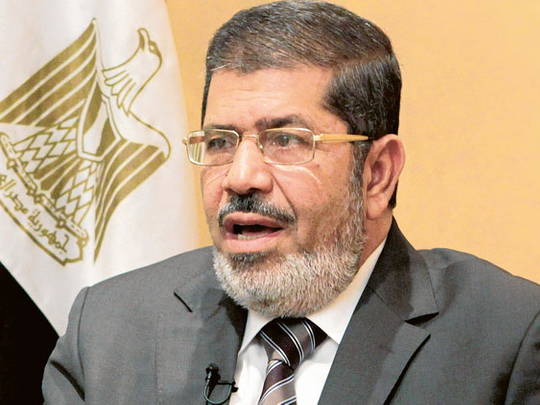
An explosion in Eilat is blamed by the Israelis on rockets fired from the Sinai peninsula. Since the attack on Egyptian forces on a border post that left 16 dead, Egyptian authorities are active in operations targeting supposedly militants in the vast desert and hills on its eastern borders. Egyptian President Mohammad Mursi grabbed the opportunity to effect a change in the political sphere. Egyptians heatedly debated the presidential decision to sack heads of the army and the Supreme Council of Armed Forces (SCAF) that took power after Hosni Mubarak was forced to leave office by a popular uprising early last year.
Supporters, members and followers of the Muslim Brotherhood see the move as a step towards strengthening the Islamist president’s authority by dismantling the rival SCAF. His opponents, fragmented political factions who were hopeful SCAF will remain a check on Islamists’ power, consider the decision a ‘soft coup-d’état’. Yet, the move was inevitable, as it is impossible to have two power centres leading the country. SCAF was clear from the beginning that it won’t hold on to power.
One important outcome is that most Egyptians were actively involved publicly in discussing a presidential decision, commending and criticising it in equal measure. That’s one of the main achievements of the January 25 revolution in Egypt. Though the ‘retirement’ of top generals was to come anyway, the timing of the presidential move was significant.
The Sinai attack was not the first — though it was more bloody — and will not be the last. Media attention has started focusing on ‘terrorist’ groups in the so-called ‘lawless’ area of Sinai. Whether Sinai is becoming a safe haven for ‘terrorists’ is a matter of question, even if one cautiously accepted the western narrative about Al Qaida. Actually, the region has got a lot of reasons to be pain-in-the-neck for Egyptian authorities in Cairo.
Since Egypt regained Sinai in the late 1970s after the Camp David accords with Israel, inhabitants of the peninsula — mostly Bedouin — faced negligence and injustice. Tourists might remember Sharm Al Shaikh, Ne’ma Bay and other resorts in south Sinai as great developments, but the Mubarak regime distributed the region’s land and mineral resources to his cronies with almost no benefit to the local population.
Mubarak’s billionaire friend Hussain Salem — now in jail in Spain – led tourism projects in the south. Others cultivated land the Bedouin consider theirs. They built factories, but did not employ the locals. Earlier, many drug barons cultivated cannabis and weed in areas of Sinai, and the police used to accuse Bedouins of collaborating with planters and smugglers.
As the peace treaty with Israel prevents Egypt from stationing troops in Sinai, the police was the main player representing the ‘state’. Brutal practices of the police and state security services, ignoring traditional Bedouin values, and increasing unemployment among the young population almost led to a breakdown of trust between the people of Sinai and the authorities. Later, as the Gaza Strip was cut off by an Israeli siege, the Bedouin partly benefited from illicit trade with Gaza.
Meanwhile, human trafficking gangs smuggling Africans to Israel gained a foothold in Sinai. So, there are many parties in Sinai who can take arms against the authorities (Egyptian and Israeli alike) rather than Osama Bin Laden or Ayman Al Zawahry affiliates. Nevertheless, in the days to come, we’ll hear more about Al Qaida flourishing in Sinai.
It’s known that Tantawi, and top generals in the Egyptian army, long-resisted American persuasion to be more active in the global war on terror (like the Pakistani army for that matter). The generals feared dilution of the ‘fighting doctrine’ of the army might weaken the institution and jeopardise its power-base in the country. Tantawi, in particular, was dubbed by the Americans as “old-fashioned and rigid”, though the man might have been playing that game with Mubarak who wanted to keep a bargaining chip with Washington by saying to Americans: “I can’t go far against the wishes of the army.”
Mursi may have used the Sinai attack as a golden opportunity to get rid of Tantawi and other generals. It is a multi-faceted message: Internally, strengthening his grip on power and putting an end to the ‘transitional period’; regionally, emphasising that Egypt is now ready to play another role other than that in the Mubarak-era; internationally, telling the world that there’s only one address to correspond with Egypt — Muslim Brotherhood. Probably, the main message concerning timing is embedded in Sinai and the ‘war on terror’. Islamists in Egypt, now in full control of the country, would be the best partners to the American-Israeli axis on the global ‘war on terror’. They can also persuade Hamas in Gaza to join and detach itself from the Hezbollah-Iran axis. Islamists from Morocco to Syria are ready to fully cooperate in the ‘Brotherhood against terrorism’ project.
Dr Ayman Mustafa London-based Arab writer.










